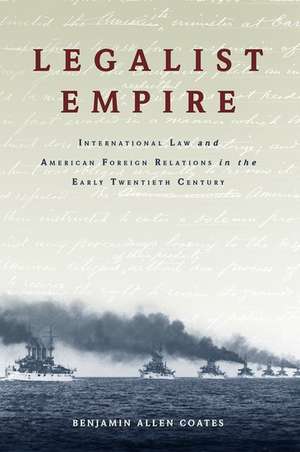Legalist Empire: International Law and American Foreign Relations in the Early Twentieth Century
Autor Benjamin Allen Coatesen Limba Engleză Paperback – 25 apr 2019
| Toate formatele și edițiile | Preț | Express |
|---|---|---|
| Paperback (1) | 196.81 lei 31-37 zile | |
| Oxford University Press – 25 apr 2019 | 196.81 lei 31-37 zile | |
| Hardback (1) | 320.53 lei 31-37 zile | |
| Oxford University Press – 4 aug 2016 | 320.53 lei 31-37 zile |
Preț: 196.81 lei
Preț vechi: 237.84 lei
-17% Nou
Puncte Express: 295
Preț estimativ în valută:
37.67€ • 40.93$ • 31.66£
37.67€ • 40.93$ • 31.66£
Carte tipărită la comandă
Livrare economică 10-16 aprilie
Preluare comenzi: 021 569.72.76
Specificații
ISBN-13: 9780190055585
ISBN-10: 0190055588
Pagini: 298
Ilustrații: 5 hts
Dimensiuni: 231 x 155 x 20 mm
Greutate: 0.45 kg
Editura: Oxford University Press
Colecția OUP USA
Locul publicării:New York, United States
ISBN-10: 0190055588
Pagini: 298
Ilustrații: 5 hts
Dimensiuni: 231 x 155 x 20 mm
Greutate: 0.45 kg
Editura: Oxford University Press
Colecția OUP USA
Locul publicării:New York, United States
Recenzii
A great power needs great lawyers. That may sound like an odd prescription for achieving global hegemony, but in Legalist Empire: International Law and American Foreign Relations in the Early Twentieth Century, the historian Benjamin Coates proves beyond a reasonable doubt that American lawyers, their doctrines, and their arguments played a pivotal role in America's entrance onto the global stage....Legalist Empire is a tremendous contribution to scholarship on America's investment in and relationship to international law. In-depth historical research and Gilded Age biography are seamlessly interwoven with the law, making for a historically enlightening read that is not bogged down in legalese. Ironically, for all the book's focus on lawyers, Professor Coates happens not to be one—but few lawyers could have made a stronger case.
[A]ccessible and well-written....Coates's study provides a useful overview of the period from 1900 to 1926, covering the often-prominent role of international lawyers in many major U.S. foreign policy events, including the Panamanian Revolution (1903), the Venezuelan and Dominican debt crises (1902-1903, 1902-1905), the Mexican Revolution (1910-1920), the 1911 arbitration treaties, and World War I.
Legalist Empire provides a fresh account of the developing profession of international lawyers...Legalist Empire represents a striking and eminently well-researched account of the development of international law and international lawyers in America over the Progressive Era and beyond. It successfully problematizes the role of international law and legalist thinking in Empire
[Coates] paints a complex picture of when US leaders followed and even moved to promote international law and when they chose to disregard it....Legalist Empire has added a much-neglected legal dimension to the study of American foreign relations. Coates has thrown enormous light on the role of international lawyers in American foreign policy. His book illuminates not only the ambiguous nature of international law, but also the subtle ways power is exercised. Moreover, it is a wonderful example of cross-fertilization between history of American foreign relations and international law. It is therefore exemplary in its interdisciplinary approach as well. It suggests how one can benefit from an outside perspective by working across disciplines and literatures.
Legalist Empire helps to expand the historiography of U.S. foreign relations by placing international law alongside military, economic, and cultural hegemony. It also complicates our understanding of international law, often treated solely as a post-1945 phenomenon, by chronicling its development and deployment in an earlier period.
Coates has produced a very stimulating and thoughtful overview of the intellectual history of international law in the United States in the twentieth century. He finishes with a glimmer of optimism that international law currently, rather than unworkable or obsolete, may merely be changing, as indeed it always has.
Absorbing and provocative Coates offers very rich, new detail of developments in American international legal thought and the profession.
Legalist Empire represents a striking and eminently well-researched account of the development of international law and international lawyers in America over the Progressive Era and beyond...[Its] overt recognition of the instrumentality of international law and its grounding in the ideological motivations of its practitioners...provides the reader with important lessons about how (and why) international law might be practiced today and into the future.
[Coates'] integration of American legal history, the historical development of international law, and the history of US foreign relations in the early 20th century add new dimensions to the literature...Recommended for university and larger public libraries and specialized collections in international affairs, US foreign policy, and international law.
Why do states comply with international law, to the extent that they do? Benjamin Coates offers a new and compellingly argued analysis of the role of international law in global politics. His carefully researched history of the key roles of international lawyers themselves injects the study of the culture of professionalism and politics of empire into an often poorly understood era in US history. Legalist Empire offers a fresh interpretation of the interaction of law and the modern state.
Benjamin Coates brings law into the center of the history of the United States role in the world in this important and carefully crafted book. American global power was conceptualized and understood in part through law, he argues. In this way, American empire and international law were not oppositional, but flourished together. Highly recommended.
Coates has produced a close reading of the role of legalism in US foreign policy in the first half of the twentieth century. As the country was imagining itself as a 'great power', its lawyers did their best to argue that international law was relevant, indeed helpful for that project. This is a wonderfully detailed
This brilliant book transforms our understanding of US foreign relations during the Progressive era and beyond it, powerfully revealing the role of international law as a versatile instrument of American hegemony. It will be indispensable for legal historians, US international historians, and scholars of law and empire.
A major contribution to a deeper understanding of a decisive era in US foreign policy. We now better understand when, how and by whom some of the legal techniques of 'modern imperialism' were created in the state department and legally justified....The book fills a lacuna both in US diplomatic history and in the history of the institutionalization of the US international legal profession."-Jochen von Bernstorff, European Journal of International Law
A new interpretation of a crucial era in American diplomatic history ... Deeply researched and well-written, Legalist Empire is an important work. It should be on the reading list of anyone interested in American foreign relations, international law, or imperialism.
[A]ccessible and well-written....Coates's study provides a useful overview of the period from 1900 to 1926, covering the often-prominent role of international lawyers in many major U.S. foreign policy events, including the Panamanian Revolution (1903), the Venezuelan and Dominican debt crises (1902-1903, 1902-1905), the Mexican Revolution (1910-1920), the 1911 arbitration treaties, and World War I.
Legalist Empire provides a fresh account of the developing profession of international lawyers...Legalist Empire represents a striking and eminently well-researched account of the development of international law and international lawyers in America over the Progressive Era and beyond. It successfully problematizes the role of international law and legalist thinking in Empire
[Coates] paints a complex picture of when US leaders followed and even moved to promote international law and when they chose to disregard it....Legalist Empire has added a much-neglected legal dimension to the study of American foreign relations. Coates has thrown enormous light on the role of international lawyers in American foreign policy. His book illuminates not only the ambiguous nature of international law, but also the subtle ways power is exercised. Moreover, it is a wonderful example of cross-fertilization between history of American foreign relations and international law. It is therefore exemplary in its interdisciplinary approach as well. It suggests how one can benefit from an outside perspective by working across disciplines and literatures.
Legalist Empire helps to expand the historiography of U.S. foreign relations by placing international law alongside military, economic, and cultural hegemony. It also complicates our understanding of international law, often treated solely as a post-1945 phenomenon, by chronicling its development and deployment in an earlier period.
Coates has produced a very stimulating and thoughtful overview of the intellectual history of international law in the United States in the twentieth century. He finishes with a glimmer of optimism that international law currently, rather than unworkable or obsolete, may merely be changing, as indeed it always has.
Absorbing and provocative Coates offers very rich, new detail of developments in American international legal thought and the profession.
Legalist Empire represents a striking and eminently well-researched account of the development of international law and international lawyers in America over the Progressive Era and beyond...[Its] overt recognition of the instrumentality of international law and its grounding in the ideological motivations of its practitioners...provides the reader with important lessons about how (and why) international law might be practiced today and into the future.
[Coates'] integration of American legal history, the historical development of international law, and the history of US foreign relations in the early 20th century add new dimensions to the literature...Recommended for university and larger public libraries and specialized collections in international affairs, US foreign policy, and international law.
Why do states comply with international law, to the extent that they do? Benjamin Coates offers a new and compellingly argued analysis of the role of international law in global politics. His carefully researched history of the key roles of international lawyers themselves injects the study of the culture of professionalism and politics of empire into an often poorly understood era in US history. Legalist Empire offers a fresh interpretation of the interaction of law and the modern state.
Benjamin Coates brings law into the center of the history of the United States role in the world in this important and carefully crafted book. American global power was conceptualized and understood in part through law, he argues. In this way, American empire and international law were not oppositional, but flourished together. Highly recommended.
Coates has produced a close reading of the role of legalism in US foreign policy in the first half of the twentieth century. As the country was imagining itself as a 'great power', its lawyers did their best to argue that international law was relevant, indeed helpful for that project. This is a wonderfully detailed
This brilliant book transforms our understanding of US foreign relations during the Progressive era and beyond it, powerfully revealing the role of international law as a versatile instrument of American hegemony. It will be indispensable for legal historians, US international historians, and scholars of law and empire.
A major contribution to a deeper understanding of a decisive era in US foreign policy. We now better understand when, how and by whom some of the legal techniques of 'modern imperialism' were created in the state department and legally justified....The book fills a lacuna both in US diplomatic history and in the history of the institutionalization of the US international legal profession."-Jochen von Bernstorff, European Journal of International Law
A new interpretation of a crucial era in American diplomatic history ... Deeply researched and well-written, Legalist Empire is an important work. It should be on the reading list of anyone interested in American foreign relations, international law, or imperialism.
Notă biografică
Benjamin Allen Coates is associate professor of history at Wake Forest University.















